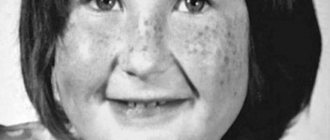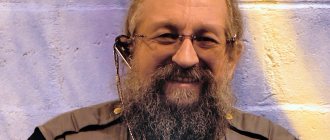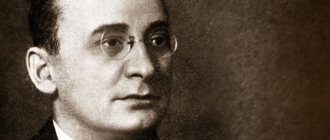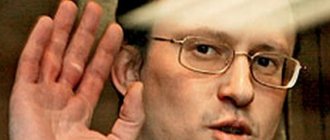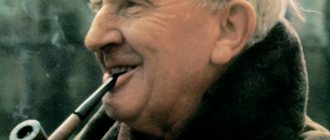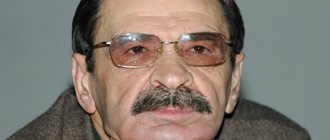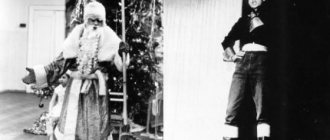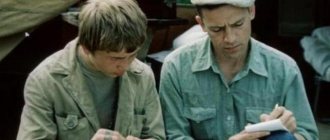Difficult childhood. Pyotr Aleinikov: biography
The future artist was born in July 1914 in the village of Krivel, Mogilev province of the Russian Empire. Besides him, there were 5 more children in the family. When the boy was 6 years old, his father, Martyn Aleinikov, died of pneumonia. He fell ill after rafting timber through icy water. When he was very young, Petya went into the service of a more prosperous peasant named Korney as a shepherd. Then he was a shepherd for his grandfather Talash, who opened his eyes to the world. The old man told the boy that he had once been a soldier, that there were big cities in the world, with large apartment buildings, palaces, and squares. And then Petya decided to himself that one day he would escape from his village and see all this with his own eyes.
Notes
- ↑ 12345
Great Russian Encyclopedia: In 30 volumes / Chairman of scientific editor. Council Yu. S. Osipov. Rep. edited by S. L. Kravets. - M.: Great Russian Encyclopedia, 2005. - T. 1: A - Questioning. — 766 p. - Now - in the Gorodetsky village council of the Shklovsky district, Mogilev region of the Republic of Belarus.
- National Historical Archive of Belarus, f. 1781, op. 48, d. 23, l. 242, app. 73 - record of the baptism of Peter Aleynik
- Aleinikov, Peter Martynovich (English) on the Internet Movie Database website
- Alexander Nilin. Peredelkino station: on top of fences. A novel of private life. - M.: AST, 2020. - ISBN 978-5-17-087072-1.
- Aleynikov Pyotr Martynovich // Moscow Encyclopedia. / Ch. ed. S. O. Schmidt. - M., 2007-2014. — T. I. Faces of Moscow: [in 6 books].
Life of a “beggar”
The mother, left with 6 children in her arms, did not have time to get bread for them all, and somehow said in her hearts that it would not be bad for the older children - Petya and his older sister Katya - to go begging. But the girl found such life a burden, and she stopped this activity and returned home, but the boy liked it. The first city in which Pyotr Aleinikov found himself, whose biography is described in this article, was Bykhov - a tiny settlement, but it made a stunning impression on the boy. Then there were Gomel, Minsk, Borisov and others. He wandered and even stole, for which the police detained him more than once and placed him in children's colonies, from where he escaped, but was caught again and again ended up behind bars.
First love
Pyotr Aleinikov, whose biography as a film artist began precisely in Gerasimov’s films, met his first love on the set. He recklessly falls in love with his partner, aspiring actress Tamara Makarova. However, the young man did not dare to talk about his feelings, silently enduring love suffering. As a result, Tamara marries, but not Aleinikov, but Gerasimov. Heartbroken, Peter drowned out his problems with alcohol, which ended in a long binge. He could not continue filming and left the set.
Introduction to cinema and first acting experience
One day, Pyotr Aleinikov was once again detained, and he was sent to the Shklov boarding school. There was a cinema next to it. The boy liked to go into the projectionist’s booth and learn this craft from him. It was here that he became addicted to watching films and then became infected with the dream of becoming an artist. He escaped from the boarding school and headed to Moscow to implement his idea, but the fugitive was caught again and sent to the Barsukovsky labor colony for children and teenagers. It was here that his dream of acting came true. He organized a drama club among the students, staged plays and acted himself. One day, director Vladimir Kumelsky came to the performance, and he noticed the talent of young Petit.
Professional education
In 1931, 17-year-old Pyotr Aleinikov ended up in Leningrad. He settled on Okhta and decided to enter the performing arts technical school, and he had a letter of recommendation from the head of the colony. The young man impressed the admissions committee, and he was accepted into the film department. Among his teachers was Sergei Gerasimov. Aleinikov himself considered himself very lucky, because he learned a lot from his teacher. The main thing is the ability to think, have the will, distinguish true from false, have taste, listen to your intuition.
Debut
The first film role, naturally, was episodic. This happened in 1932. Sophomore Pyotr Aleinikov played in the film “Oncoming”, and three years later he was entrusted with the role of Petka in the film “Peasants”. Of course, these small roles could not reveal the full scale of his acting talent, but nevertheless they did not go unnoticed. Until 1936, he mainly played small roles in Gerasimov's films. At one of them, he met Tamara Makarova, with whom he fell seriously in love, but, as you know, she later became the director’s wife. By the way, his classmate was Georgy Zhzhenov; he knew Petya from the days of his homeless life.
First serious role, first popularity
In the film “Seven Braves,” which was filmed in 1936, Aleynikov Pyotr Martynovich played the role of the cook Molibog, the “polar hare,” who was involved in smuggling. She not only brought him fame, but also the true love of the audience. It was a picture about young polar explorers, about their perseverance and courage. Naturally, the film was not filmed in the Arctic. To do this, the film crew and actors went to the North Caucasus to the glaciers of Elbrus, and then to the islands of the Barents Sea. Pyotr Aleinikov was very worried and even afraid of the camera, because this was his first serious role. After the film was released, all the worries were left behind. The audience liked the picture, and the artists won universal love.
Biography and books of the author Nikolay Oleynikov
Nikolai Makarovich Oleinikov (August 5 (17), 1898, Kamenskaya village, All-Great Don Army - November 24, 1937, Leningrad) - Russian Soviet writer, poet, screenwriter. He was the editor of the magazines "Hedgehog" (1928-1929), "Chizh" (1934, 1937), etc. Pseudonyms - Makar Ferocious, Nikolai Makarov, Sergei Kravtsov, N. Tekhnorukov, Mavsolev-Kamensky and Pyotr Myopic.
Biography
Born in the village of Kamenskaya (now the city of Kamensk-Shakhtinsky, Rostov region) in the family of a wealthy Cossack. He graduated from the 4th grade of the district men's school, then studied at the real school, and in 1916 he entered the Kamensk Teachers' Seminary. He took part in the Civil War, volunteering for the Red Army in March 1918. In 1920 he joined the RCP(b). He worked for the Kamensk newspaper “Red Cossack”. Having moved to the city of Bakhmut, he becomes the executive secretary of the newspaper “All-Russian Stoker”. Having met the writers Mikhail Slonimsky and Evgeny Shvarts who came from Petrograd, together with them in 1923 he organized the publication of a literary and artistic supplement to the newspaper - the magazine “Zaboi” (the first issue was published in September of that year). In 1925, already an experienced editor, Oleinikov received an appointment from the Central Committee of the All-Union Communist Party of Bolsheviks to Leningrad, to the newspaper Leningradskaya Pravda. Works in the editorial office of the children's magazine "New Robinson", created by Samuil Marshak.
In 1926-1928. collaborates with various Leningrad and Moscow magazines, organizes children's radio broadcasting. In 1928, Oleinikov became the editor of the new “Monthly Magazine” for children (“Hedgehog”), in which Korney Chukovsky, Boris Zhitkov, Vitaly Bianki, Mikhail Prishvin, Evgeniy Shvarts, as well as poets of the OBERIU group (Daniil Kharms, Alexander Vvedensky, Nikolai Zabolotsky), which Oleinikov himself joined. He most often published his works in the magazine “Hedgehog” under the pseudonym “Makar Ferocious”.
Since the beginning of 1937, Aleinikov has headed the publication of another children's magazine, “Cricket,” and on July 3 of that year he was arrested as “a member of a counter-revolutionary Trotskyist organization” and on November 19 sentenced to death. Oleinikov was shot on November 24, 1937 in Leningrad. Rehabilitated posthumously in 1957. At the same time, his widow received a certificate from the registry office that her husband died “of relapsing fever on May 5, 1942.” This unreliable date was included in many biographical reference books and encyclopedias.
Creation
Oleinikov created a complex, original poetics, behind the external primitivism of which lay a subtle and sometimes provocative irony regarding Soviet officialdom and an exquisite parody not only of graphomaniac poets, but also of Alexander Pushkin and his fellow OBERIU member Nikolai Zabolotsky. Oleinikov’s literary activity also includes dramatizations for the children’s theater, a libretto for the opera “Crucian Carp” for D.D. Shostakovich, scripts (together with Evgeny Schwartz) for the films “Wake up Helen” (1934), “Helen and the Grapes” (1935).
60 years after his death, in 1997, Kharkov composer and director Aleksey Kolomiytsev wrote the rock opera “Vivisection” based on his parable poems about small animals.
Editions
First Council, 1926 Battle days, 1927 Tanks and sleds, 1928 Poems // “Thirty Days”, 1934, No. 10 Two poems (“Cockroach”, “Change of name”) // almanac “Poetry Day”, Leningrad, 1966 Poems / / “Questions of Literature”, 1969, No. 3; 1970, No. 7 Poems, Bremen, 1975 Ironic poems, New York, 1982 Change of name, 1988 Abyss of passions, 1990 For a fly..., 1990 Fighting days, 1991 Poems and poems, 2000 Vulcan and Venus, 2004 Circle of smart guys, 2008
Best roles
Pyotr Aleinikov, whose films almost always won the sympathy of the audience, did not know how to adapt to circumstances. They wrote letters to him, women confessed their love. He was not such a “guy” of the people. He had no rules, he did not try to please anyone. Therefore, all awards and titles passed him by. He was especially remembered by everyone for Leonid Lukov’s film “Big Life”. Here Pyotr Aleinikov (actor) played the role of miner Ivan Kursky. He was one of those artists who raised the spirit of the people, although his superiors did not like him. He was adored by both adults and children, especially after he played the role of Ivan the Fool in the fairy tale “The Little Humpbacked Horse” by Alexander Row. He also starred in Stanislav Rostotsky’s first film, “Earth and People.” He was even lucky enough to play the role of Pushkin in the film “Glinka”. After that, he practically did not act: from the 50s to the 60s there were only 3 episodic roles.
Terrible disease
In 1946, he was offered the role of Vanya Kursky in the film novel “Big Life”. He agreed. The film was successful.
And Pyotr Martynovich could have performed many more such characteristic roles if not for his addiction to alcohol. His talent and merits were crossed out by completely inappropriate behavior, which he repeatedly demonstrated on the set. They stopped inviting him because he might not come to rehearsals, to filming, or even go on a drinking binge and disappear to God knows where.
View gallery
Alcoholism greatly undermined the artist’s health. Frequent consumption of alcohol provoked the appearance of many diseases of the heart, blood vessels, and musculoskeletal system. And in the early 60s, due to progressive wet pleurisy, one lung failed, as a result of which it had to be removed.
In 1955, aspiring director S. Rostotsky began filming his first film, “Earth and People.” At his own peril and risk, he invited Aleinikov to one of the roles, who by that time had not acted at all for several years. Pyotr Martynovich swore to the director that he would not drink and would not let him down. The artist kept his promise, but after filming he returned to his old ways and went on a long binge. The disease completely consumed him. Aleinikov left the family, completely forgetting about his wife and children (in addition to his son, he had a younger daughter, Arina). He lived somewhere unknown, as a rule, these were the apartments of complete strangers, who, like him, were captured by a terrible disease - alcoholism.
His last work was participation in the film “Quenching Thirst”. Then, a few months before his death, he seemed to prove in parting that he was a truly talented and reliable actor. He didn’t drink, worked on the set for 12 hours, impressing everyone with his hard work.
But the exhausted body could not stand it. Pyotr Aleinikov, an actor whose biography proves the tragic consequences of alcohol abuse, passed away on June 9, 1965. His body rests in the Novodevichy cemetery.
Pyotr Aleinikov: personal life
The artist was married to actress Valentina Lebedeva, who gave birth to his son Taras. He met her at Lenfilm. In the fairy tale about “The Horse,” both Valya and Tarasik played with him, albeit in episodic roles. Before meeting him, the artist’s wife was an installer, and after marriage she became a housewife. In 1944, the couple were evacuated, and here the Aleinikovs had a daughter, who was named Arina. Everyone said that Peter was a monogamist. After Valentina appeared in his life, he didn’t look at anyone else, although there was no end to his fans. He was also a great jealous person; he could be jealous of his wife even of close friends.
Personal life of Pyotr Aleinikov
Aleinikov was married to Valentina Lebedeva, whom he met at the Lenfilm film studio.
Lebedeva worked there as an installer. After the birth of her son, Valentina became a housewife. The daughter was born when the family was evacuated in 1944. Taras (son of an actor) became a cinematographer, daughter Arina became an actress. The actor was devoted to his wife all his life. Many acquaintances were surprised at how he managed to “run away” from numerous fans. Aleinikov was very ill; he had surgery on his legs and had a lung removed, which caused him to often suffocate.
Interesting Facts
Pyotr Aleinikov was an adventurer and a restless person. He could easily get into a taxi and leave Leningrad for Moscow, and then only discover that there was no money in his pocket, then he would get out of the car and ask passers-by for money, and they would almost stand in line to give the required amount to their idol . His wife didn’t like all this, but she tolerated all his antics. Nevertheless, he was not an alcoholic, although some acquaintances spoke of him that way. The last film in which Peter played was “Quenching Thirst,” where he starred with his children. He was seriously ill and died in 1965, and 3 years later he was posthumously awarded a first degree diploma at the Leningrad Film Festival for this film.
